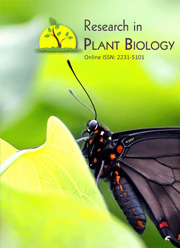Fungitoxicity of some fungicides against to pathogens responsible of olive trees decline in the Chebika’s area in Tunisia
Keywords:
Decline, olive trees, chemical and biological control, in vitro, in vivoAbstract
The incidence of the disease seems very important on young trees and tends to bemoderate with the aging of the tree. In fact, olive trees have a shallow root system and arestill vulnerable to pathogens especially the irrigated varieties. Chemical and biological control against Fusarium solani, Fusarium oxysporum, Rhizoctonia solani and Verticillium dahliae have revealed that the application in vitro of Prodazim and of Methyl-thiophanatehave showed a very good efficacy up to 100%. Ridomil and Tachigaren have indicated aregular efficiency, while the two bio-fungicides Fungstop and the compost juice havedemonstrated a low efficiency. The two bio-control agents Trichoderma harzianum and Gliocladium virens have showed a relatively high effectiveness in vitro. In vivo, obtainedresults have revealed that the nature of the product, the doses applied and the condition ofthe olive trees are highly correlated factors. The treatment doesn’t appear to have apositive effect on the beginning of stage 1 and on plots presented a good structured soil.Going beyond this stage, whatever the product and the doses used, the attack isirreversible.Downloads
Download data is not yet available.
Published
15-04-2011
How to Cite
Salem I., B., Boughalleb, N., Souli, M., Selmi, S., & Romdhani, M. (2011). Fungitoxicity of some fungicides against to pathogens responsible of olive trees decline in the Chebika’s area in Tunisia. Research in Plant Biology, 1(2). Retrieved from https://www.updatepublishing.com/journal/index.php/ripb/article/view/2570
Issue
Section
Articles



 .
. 